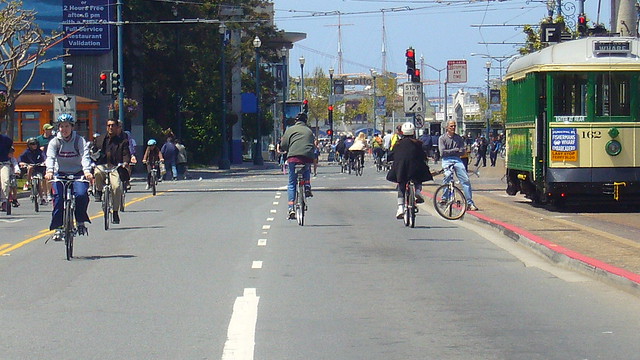
Rift #26 (Heimaey Houses), Marion Belanger, print available at 20x200.
At a recent TED talk, David Brooks, the columnist, asked, “"Why are the most socially attuned people on earth completely dehumanized when they think about policy?”
That is exactly at the heart of the challenge of understanding transportation.
Everyone knows what it’s like to use transportation – whether you walk, bike, bus, train, or drive, or a combination of any of those. These collective – yet uniquely individual - experiences are the fodder of many cocktail receptions. You can walk up to any stranger at a party and have a lively conversation for a half hour just by asking them, “how did you get here?”
From the perspective of making the policy that enables walking, biking, busing, etc, transportation is traditionally a top-down, expert-driven practice and can appear divorced from social acuity. (Come to my session at Transportation Camp to peer into the dark chasm that is the current federal transportation program. If you’re curious, there are many good books on how things in transportation got this way.)
It’s an exaggeration to say that people thinking about policy have been dehumanized though. The real problem is that the federal transportation program is broken and policymakers must struggle with an outdated structure to deliver the types of projects that the public really wants or needs. The choice we’ve made to depend on cars today forces us to send - on a daily basis - nearly $1 billion overseas, often to unstable regimes. The US transportation system currently eats up 70 percent of our oil supply. This consumption comes with a high environmental price - transportation accounts for 30 percent of US carbon emissions, and of that 30 percent, nearly 80 percent comes from our surface transportation system alone. At the same time, attempts to change the system seem futile when compared with emerging economies across the globe: China spends 9 percent of its GDP on infrastructure while we spend a paltry 2 percent.
What the public fundamentally knows about how broken the transportation system though is not from scrutinizing foreign policy or emission regulation - it's through the experience of moving around. It is much harder – more expensive, more time consuming – for people to do the everyday things they need to do. And the numbers bear witness to the hardship that our current transportation system brings: although transportation funding has increased every year, dollars lost due to congestion have also risen proportionately. Sometimes, people even risk their lives trying to get around, walking down wide, fast-moving streets without sidewalks, for example. Traffic crashes are leading cause of preventable injuries and deaths - worldwide. This has got to end.
Connecting the bottom – “how did you get to this party?” – to the top – “where should we put our billions of public dollars in transportation funding” – is a big task indeed. That is why conferences like Transportation Camp should be important to anyone who cares about how the world is positioning itself for the future. Conversations between people of all backgrounds who have come together to work on focused, shared problems are how innovation happens. This is particularly important when tackling structural issues, like the US transportation system. Every incremental collaborative step is a move towards fixing it. Now, let’s get to work.
Transportation Camp is happening March 5-6 in New York City and March 19-20 in San Francisco. Visit the web site or tumblr for more information, or follow on twitter.
Parting shot
We need to get from this, while beautifully rendered, still eons away from people
to this - why should ciclovias only happen on special days?
via flickr, mcas_sf
3.01.2011
Upcoming: TransportationCamp - Do Not Miss
Posted by Shin-pei at 3:57 PM
Subscribe to:
Post Comments (Atom)
0 comments:
Post a Comment